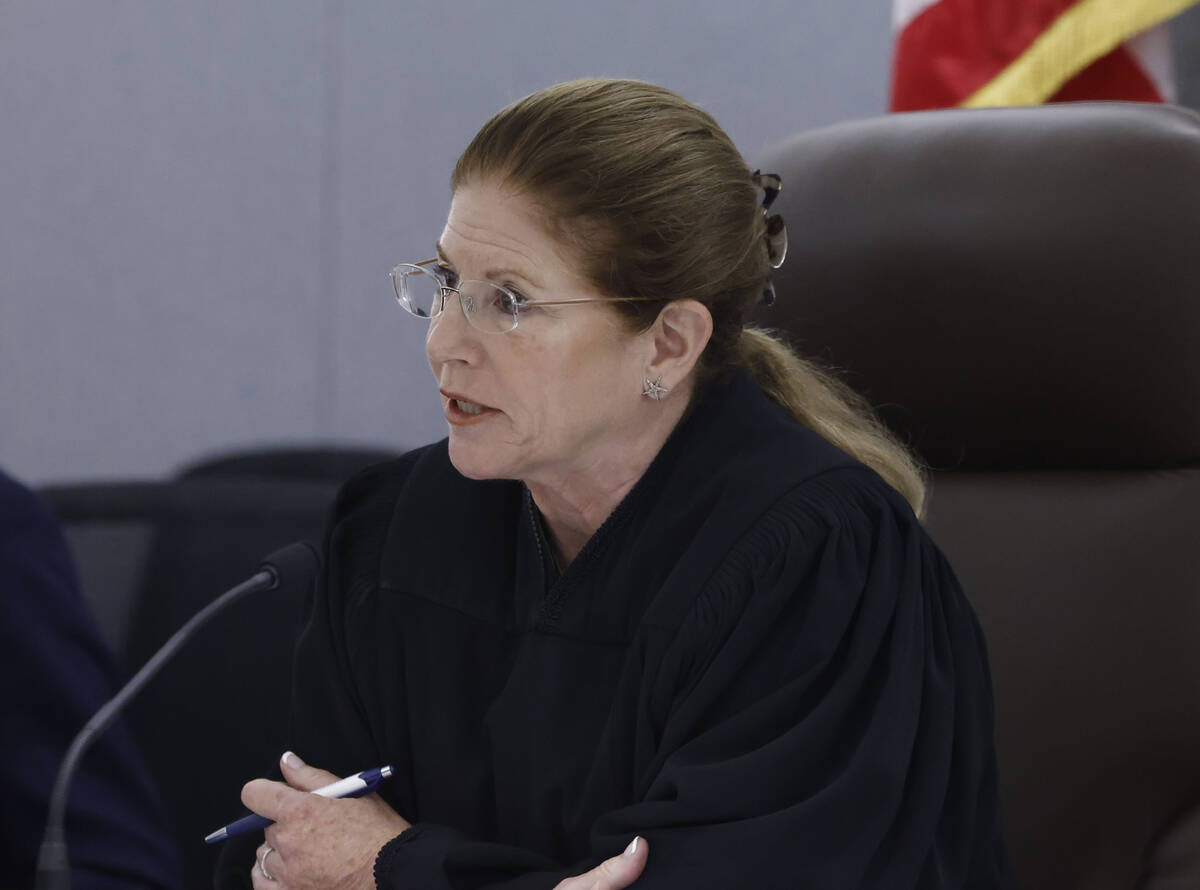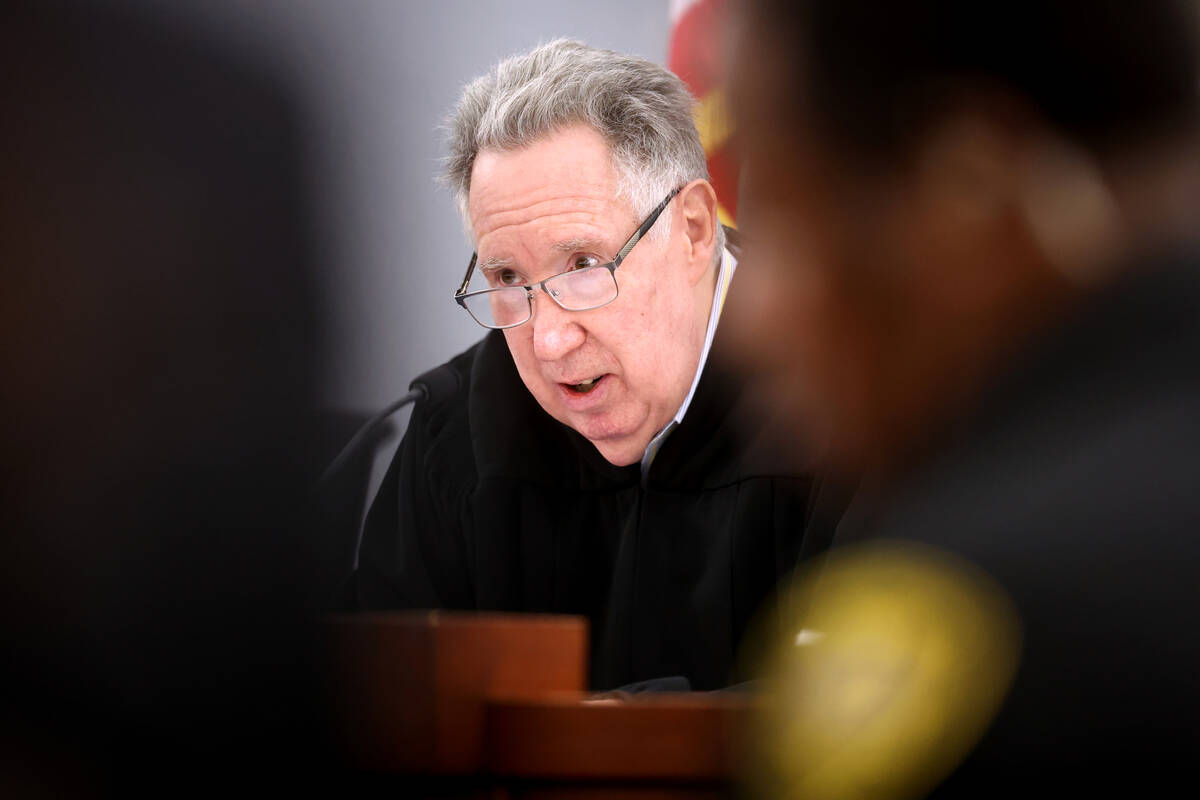What are they hiding? Judges apply unusual secrecy to Reba the bulldog case
Experts say a Clark County judge improperly sealed a plea agreement for one of the defendants accused of causing a bulldog’s death in a case that has garnered extensive public attention.
The sealing of a document that is usually available followed a judge removing the public from a courtroom. First Amendment experts have said the unusual level of secrecy seems unwarranted given the high public interest in the case, the routine nature of the plea and the importance of keeping the judicial process open to ensure public trust.
Markeisha Foster, 30, and Isaac Laushaul Jr., 32, were each indicted on a count of cruelty to animals in December after authorities accused them of abandoning their pet bulldog, Reba, in a sealed-shut plastic tote that was deposited outside a Las Vegas supermarket.
Reba was found in breathing distress and died of heatstroke, and her death led to an effort to find those involved and “Reba’s law,” which was signed by Gov. Joe Lombardo last week and is intended to increase animal cruelty punishments. Animal rights advocates and local reporters have followed the case closely and frequently attend hearings.
District Judge Ronald Israel kicked the public out of his courtroom without explanation and attempted to hold a secret hearing in her case on June 4, which an attorney for the Las Vegas Review-Journal said was unconstitutional.
“I have procedural concerns with the fact that that request (for closure) was heard in secret,” attorney Maggie McLetchie, who represents the Review-Journal, told Israel after he cleared the courtroom. “Any request for closure is supposed to be publicly filed. The public is supposed to have an opportunity to be heard before closure. A motion for closure and dialogue with the court and argument should not be made behind closed doors.”
The next day, when Israel was absent from court for a personal matter, Foster pleaded guilty to a count of attempt to kill, disfigure or maim an animal of another.
District Judge Susan Johnson accepted Foster’s plea, and court minutes indicate Johnson ordered the plea “filed under seal” after the hearing. The minutes also say it was “filed in open court under seal.” Johnson did not mention sealing the plea during the hearing.
Both judges made “a huge mistake,” said David Cuillier, director of the Freedom of Information Project at the University of Florida’s Brechner Center for the Advancement of the First Amendment.
“Typically in these cases, if a judge wants to impose this rare level of secrecy, then he or she needs to lay out why and give people a chance to argue otherwise,” he said.
Review-Journal Executive Editor Glenn Cook said secrecy in the courts is especially dangerous to the public interest.
“Nevadans need to be able to judge for themselves how justice is done, and they can’t do that if they can’t see it,” Cook said. “These are institutions and individuals with exceptional power. Openness is the ultimate check on that power.”
‘No disclosure’
Public defenders representing Foster declined to comment or did not respond to requests for comment.
A court spokesperson said Israel and Johnson would have no comment.
Defense attorney Philip Singer, who represents Laushaul and plans to place blame on Foster, said Foster’s plea was sealed because of information contained in an exhibit, which he had not seen.
“It’s discoverable … and they told me they’re going to disclose it, but not at this point,” Singer said. “No disclosure has been made.”
Singer and Chief Deputy District Attorney Agnes Botelho previously objected to the closing of the courtroom, which was apparently requested by Foster’s public defenders.
District Attorney Steve Wolfson said that in the interest of public safety, it is sometimes necessary to seal documents or proceedings. He said he could not elaborate without frustrating the purpose of the sealing in Foster’s case.
Experts: Judge failed to follow steps
While a judge makes the determination as to whether a hearing or document should be sealed, Wolfson said if both sides agree to sealing, judges usually go along with it. The district attorney understood this occurred with Foster’s plea.
But a judge needs more than an agreement to seal something, according to Review-Journal Chief Legal Officer Benjamin Lipman, who saw problems with Johnson’s actions.
To seal a court record, the party seeking to have it sealed must prove there is a state interest so compelling that it outweighs the constitutional right to access courts, Lipman said.
In the case of Foster’s plea, Lipman said, there was no motion filed saying someone wanted the document sealed or providing reasons why.
There was no meaningful notice to the public that anyone wanted the plea sealed, according to Lipman. Johnson did not give the public the opportunity to challenge the sealing. And the judge did not make findings that there were no alternatives to sealing the plea or that the sealing was narrowly tailored.
Johnson was required by Nevada court rules and U.S. Supreme Court decisions to follow those steps, but, Lipman said, “None of that was done here and plea agreements are routinely public. It’s hard to imagine there’s anything in the plea agreement that would satisfy those standards if they (followed the process).”
Jennifer Nelson, senior staff attorney for Reporters Committee for Freedom of the Press, said a plea agreement could be sealed for a limited period of time, but motions to seal records and sealing decisions should be made in the open so the public understands the decision and can challenge it.
“The analysis is not supposed to be: ‘Do the parties agree with sealing?’” Nelson said. “The analysis is supposed to be the judge looking at this and saying, ‘There is a presumption of access for the public’” then figuring out whether the issues presented “outweigh the public presumption of interest.”
University of Virginia School of Law professor Elizabeth Rowe found motions to seal were unopposed about 90 percent of the time in a recent report that examined secrecy in federal civil cases.
The sealing of court records seems to have increased in recent years, and in some of the most egregious instances, basic information has been sealed, including case citations, parties’ reasoning and entire court orders, Rowe said.
Making public information inaccessible “is certainly a serious harm to one of our institutions,” she said.
High bar for secrecy
“The bar for secrecy is really high in the courts,” Cuillier said. “The presumption is that it’s all open for everyone to see so we trust the process is fair.”
But he said he would not “infer bad intent” on the part of the attorneys and judges in Foster’s case because sometimes judges are unfamiliar with the law around sealing.
Of the records sealing, Cuillier said, “They really need to rethink that (and) let them out, given the huge public interest, in fact so high that there would be a law passed in response to this situation.”
Cuillier added: “The losers here are the public and they deserve a say in this.”
The “What Are They Hiding?” column was created to educate Nevadans about transparency laws, inform readers about Review-Journal coverage being stymied by bureaucracies and shame public officials into being open with the hardworking people who pay all of government’s bills. Were you wrongly denied access to public records? Share your story with us at whataretheyhiding@reviewjournal.com.
Contact Noble Brigham at nbrigham@reviewjournal.com. Follow @BrighamNoble on X.





















